Jan 02, 2025 – Day 10 of Bhutan Survey_Digala, Shingkhar Chiwog Survey
Hello. It’s the 10th day of our Bhutan survey. This morning, after conversing with residents at Digala Chiwog in Bardo Gewog, we moved to Khomsar Chiwog to hold a meeting about the irrigation project with the Tshogpas of Bardo Gewog. In the afternoon, we moved to Shingkhar Gewog and had a dialogue with the residents of Shingkhar Chiwog.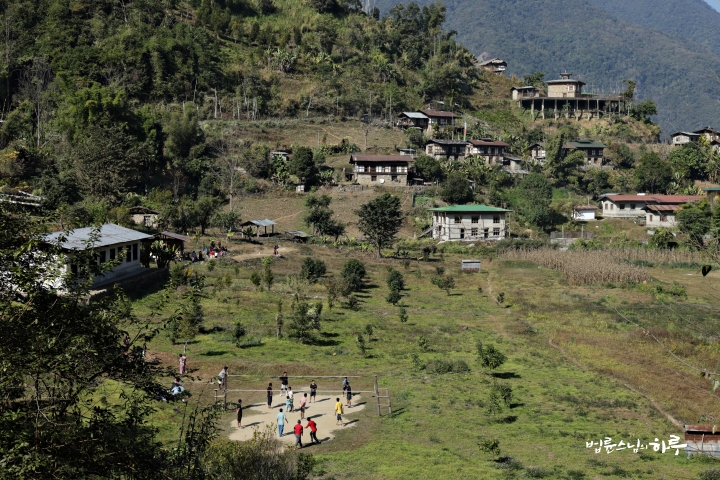
Sunim performed his early morning practice and meditation, then had breakfast with the staff at the Panbang JTS Center before setting out at 8 AM. After about an hour’s drive, he arrived at the temple in Digala Chiwog. About 40 villagers had gathered in the dharma hall.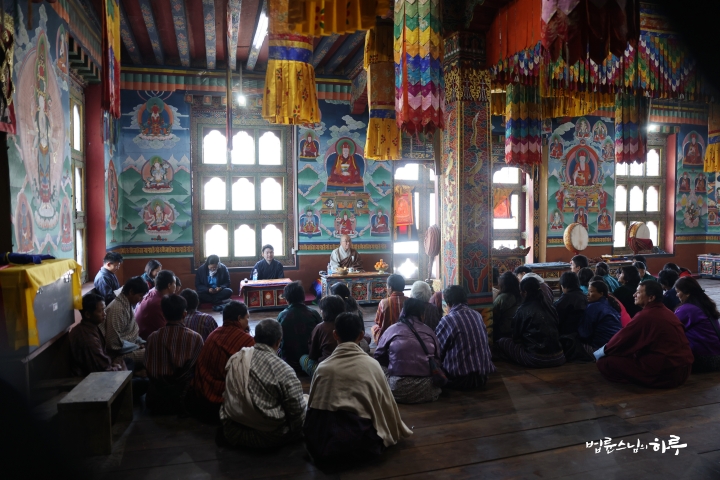
First, the Tshogpa explained the current situation in Digala Chiwog. After listening to the Tshogpa’s account, Sunim began asking questions.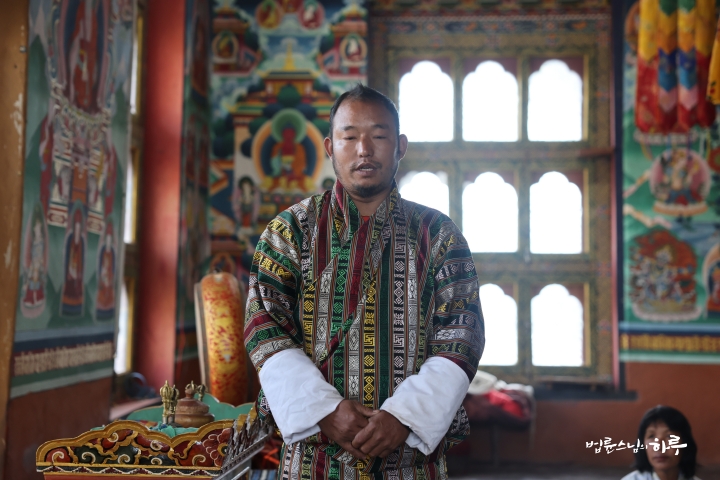
“How many households are without homes?”
“There are five households. Three have already applied and are set to receive support, and one household has only received materials so far.”
“Why don’t they have homes?”
“They have been poor since childhood.”
“For those who have homes, do they have partitions inside to divide the space?”
“Almost none of them do.”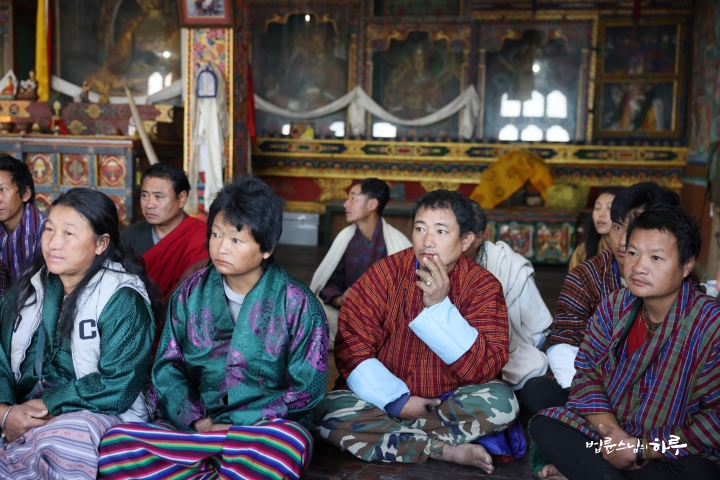
Sunim then inquired about the kitchen environment.
“Are all kitchens inside the houses?”
“Yes, they are inside the houses.”
“Do you cook rice with electricity?”
“When there’s no electricity, we cook with wood. We burn wood inside the house for cooking.”
“In the kitchen, do you put dishes on shelves, or do you just keep them in containers and use them?”
“We keep them in containers and use them.”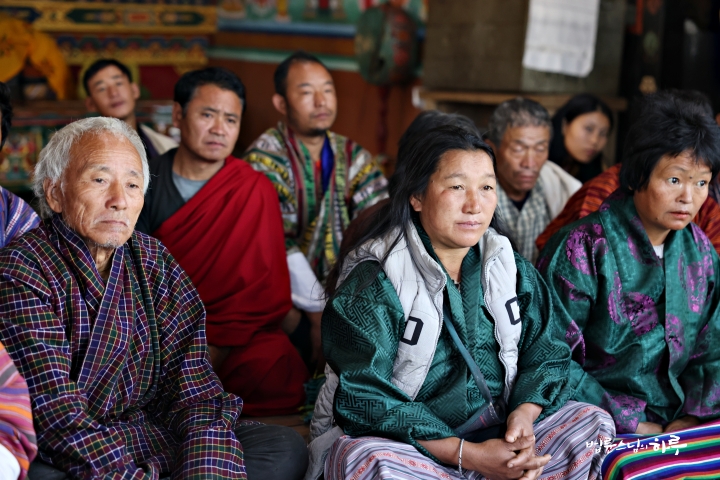
Sunim continued his questions, carefully examining the living conditions of the villagers.
“What do the men do? Why do they only eat the food women prepare? Wouldn’t it be good if they made shelves and fixed the hearths?”
“They don’t know how to make shelves.”
“When women work hard to prepare meals, shouldn’t men fix up the kitchen? Otherwise, all the wives will run away.”
“Yes, that’s right!” (Everyone laughs)
The conversation between Sunim and the villagers became increasingly lively. The villagers, who were initially tense, gradually began to smile and actively respond to Sunim’s questions. A man raised his hand and said:
“Sunim, I cook the meals.”
“Really? Is that true?”
“Yes, nowadays it’s all about gender equality.” (Everyone laughs)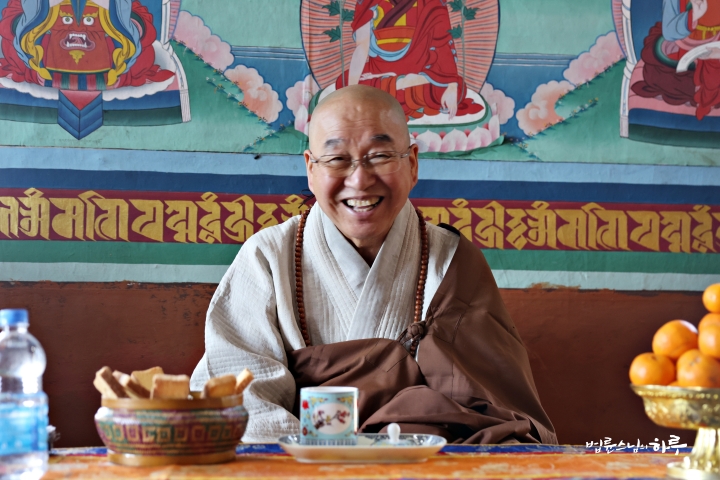
Sunim stood up and explained to the villagers how they could improve their kitchen environment.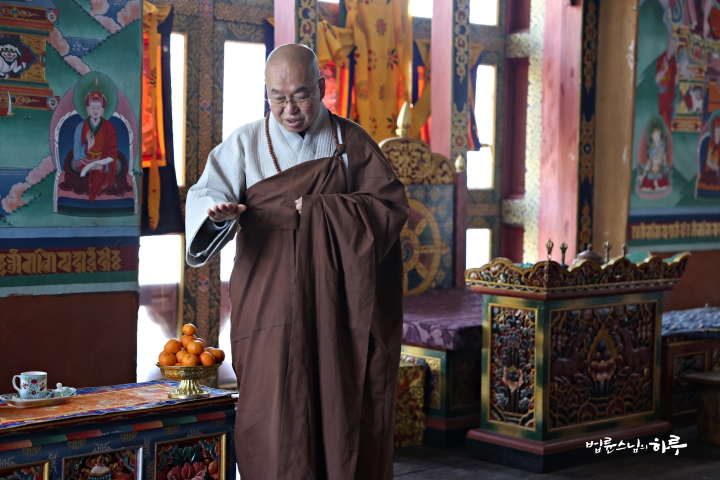
“If you raise the height of the kitchen counter like this, you can cook comfortably while standing. I’ve seen some houses that cook this way. Can’t you learn to do this?”
“There are some people who can make counters, but many don’t know how.”
“Do you have tools like hammers or saws at home?”
“No, only carpenters have tools.”
“If we provide tools, could you do it yourselves?”
“Yes, if we have the tools, it’s possible.”
“It only takes 2-3 days to learn how to make shelves.”
“That’s right. We can do it if we learn.”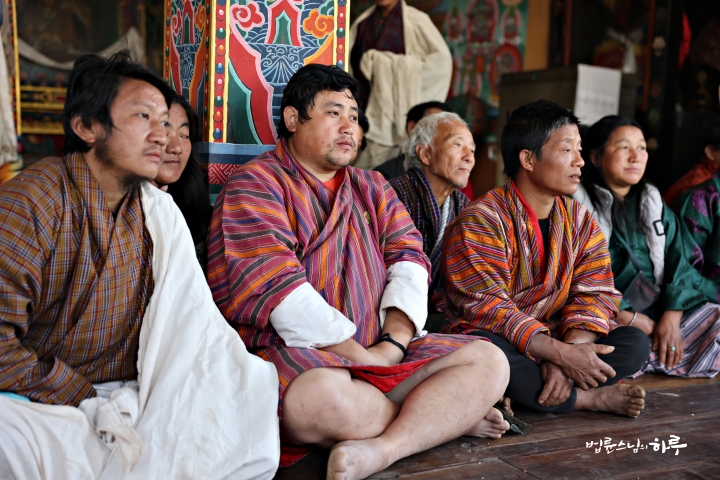
By now, the Tshogpa had stepped back from the conversation, and the villagers began to share their individual household situations.
“Where did the Tshogpa go? Are you all answering directly now?”
“The Tshogpa doesn’t know the situation of every household in the village, so we’ll answer instead.” (Laughter)
“I see. On the way here, I noticed three places where the road was damaged, with water from the mountain valleys crossing the road. Why haven’t these been fixed?”
“We’ve tried. But now it’s winter, so the water trickles, but in summer, it gushes out, washing away any structures we put in place.”
“Then why not bury pipes underground so that when there’s less water, it flows below, and when there’s too much water, it flows over the cement? You need to cover it with cement so cars can pass over it too. It would be great if the government could do this road construction, but if the budget is insufficient, couldn’t the village men work together to do it? There are many men in this village.”
“Yes, we can do it.”
After having a thorough conversation, Sunim summarized the villagers’ requests and problems, offering practical solutions.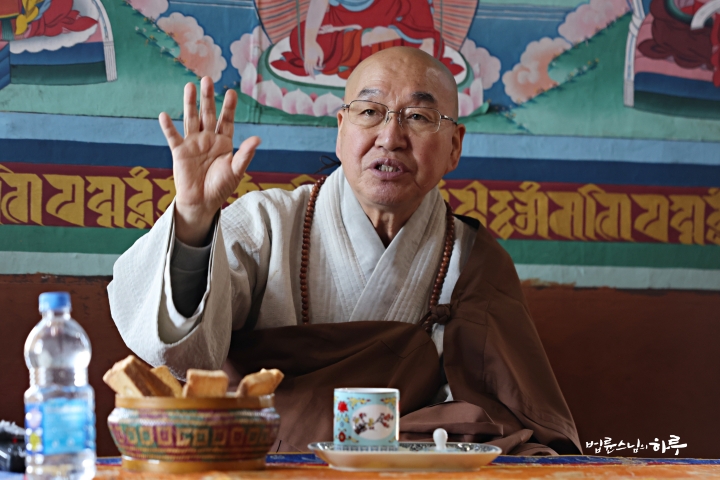
“Let’s summarize what we can do together with JTS. First, we can build houses for those without homes. But the village must take responsibility for building them. If you only receive materials but don’t build, it’s a waste. You must promise, ‘If JTS provides the materials, our village will build the houses.'”
Sunim mentioned the traditional way villagers have helped each other, emphasizing the residents’ own responsibility.
“It might be difficult to help for a whole month, but you could help for about two weeks. That’s how it’s traditionally been done in Bhutan, right? And the homeowner must also take responsibility.”
The villagers agreed and responded.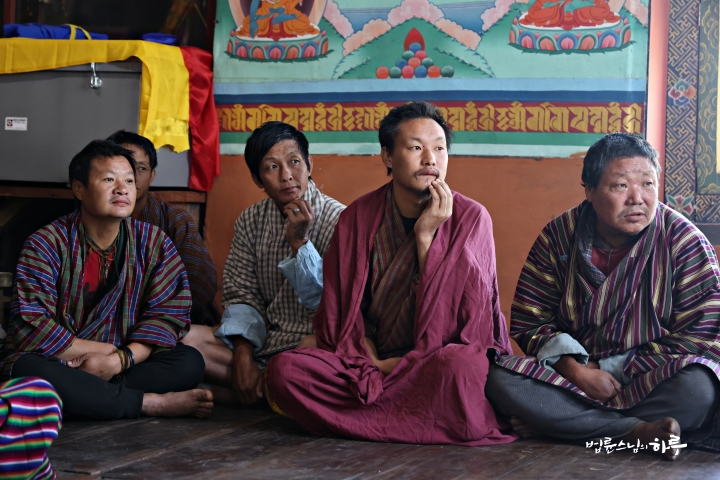
“Yes, but there are people with no skills at all. The village should build houses for such people.”
“Yes, we can fully support those who are extremely poor.”
Sunim then made his second proposal regarding house repairs and improving living conditions.
“Secondly, how about repairing your houses? We’ll provide tools and training. We’ll first make one house as a sample to show you, then you can refer to that house to repair others.”
One of the villagers expressed hesitation.
“There’s too much to repair in the houses.”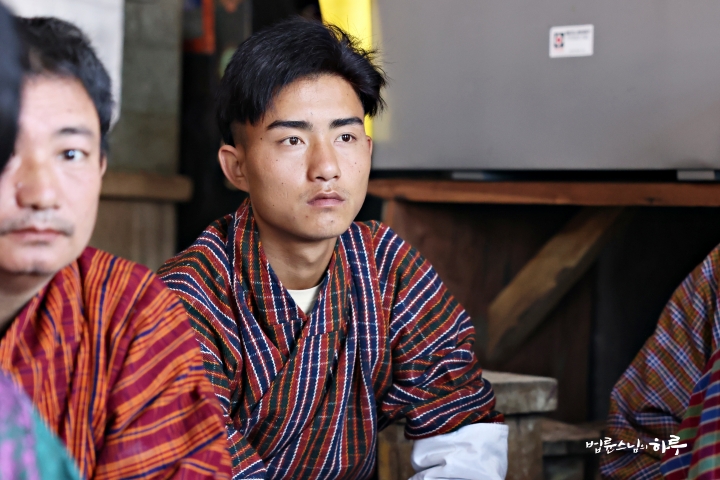
Sunim suggested priorities.
“First, install partitions in the houses, put up shelves in the kitchen and rooms, and if the toilet is dirty, fix it. Shouldn’t you be able to offer a room to guests and let them use the toilet? When your sons and daughters get married and live in the city, they should be able to bring their children to visit their grandparents. But if the house is full of smoke, the toilet is dirty, and there’s nowhere to sleep, who would want to visit their grandparents’ house?”
The villagers agreed empathetically:
“Yes, that’s right. Our children don’t want to come home.” (Laughter)
Sunim laughed and said:
“So even if the house is small, it should be clean and convenient.”
“Yes, that’s right.”
“Instead of just drinking at home when there’s no work in winter, try doing some of these things.” (Laughter)
Sunim continued with his third proposal about improving fields and the village environment.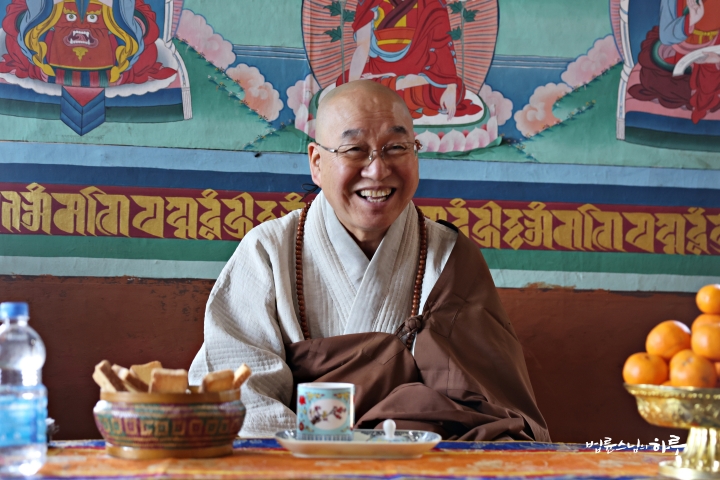
“The third task is to cut trees, drive stakes, and put up fences around the fields. Can you do this?”
“Yes, we can do it.”
Sunim emphasized the importance of self-reliant efforts to the villagers:
“Let’s try to make our village a bit more livable this way. The government can’t help with everyone’s personal living conditions. This is something we have to do ourselves. We can receive government support for public facilities like roads and water supply, but if the government budget is insufficient, we might have to wait for years. If you say ‘We’ll do it ourselves,’ I’ll provide the materials, so try doing it yourselves. Do you know Korphoo Chiwog in Trongsa Dzongkhag?”
“Yes.”
“In Korphoo, the road up to the village was too steep and people struggled. But the villagers came together and paved five sections of the road. Now cars can travel well. I heard that most of the villagers participated in building it.”
“We can do it too if we have the materials!”
“The government budget is for big projects like road construction. Repairing houses and fixing village paths are things we should do ourselves. Let’s develop our village on our own.”
“Yes, we got it!”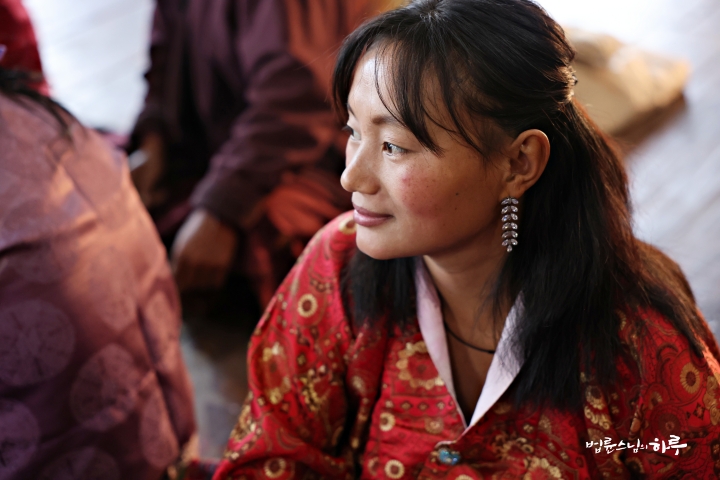
The conversation continued for about an hour. By the end of the dialogue, the villagers’ faces were animated and the atmosphere had brightened considerably. Finally, Sunim suggested ending the session with a chant together.
“Let’s conclude this time by chanting together.”
The chanting of the Digala villagers filled the dharma hall. Sunim also joined in the chanting with his hands clasped.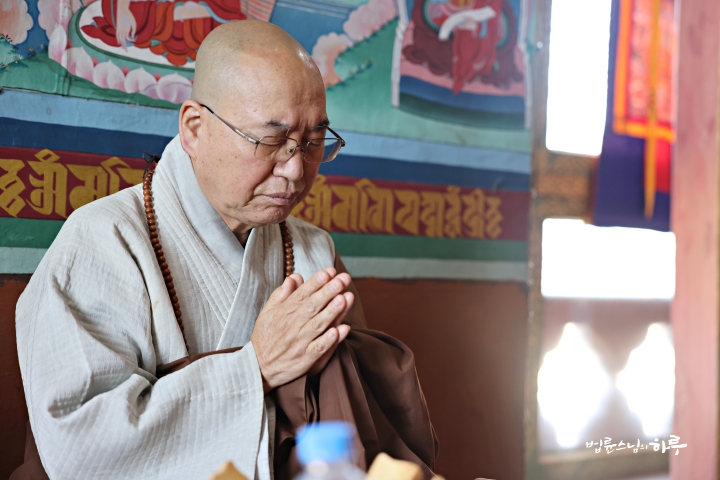
At 10:20 AM, they drove to Khomsar Chiwog. They planned to hold an irrigation project meeting with the officials of Bardo Gewog at the house of Tshogpa Phurba. Upon reviewing the application submitted by Bardo Gewog, it was noted that the budget was set higher compared to other villages. Sunim arranged this meeting to understand the reason for this difference and to find a solution.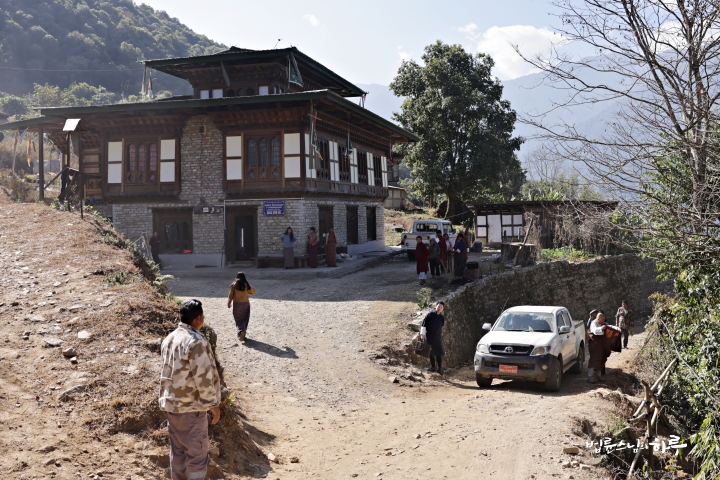
Upon arriving at Tshogpa Phurba’s house, they had lunch and immediately started the meeting. Sunim first asked about the details of the budget.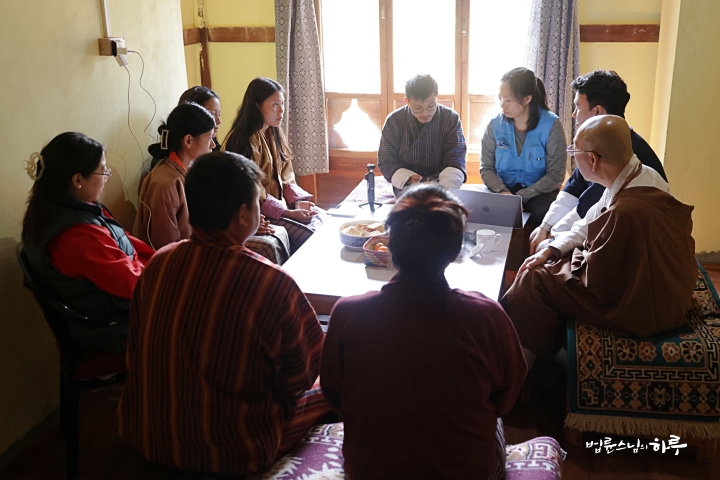
“In this irrigation construction, how many meters are being repaired, and how many meters are being newly constructed?”
“When we made the estimate, we didn’t divide it that precisely. We calculated the total length approximately and submitted the budget all at once.”
“Then who made the estimate?”
“An engineer calculated it.”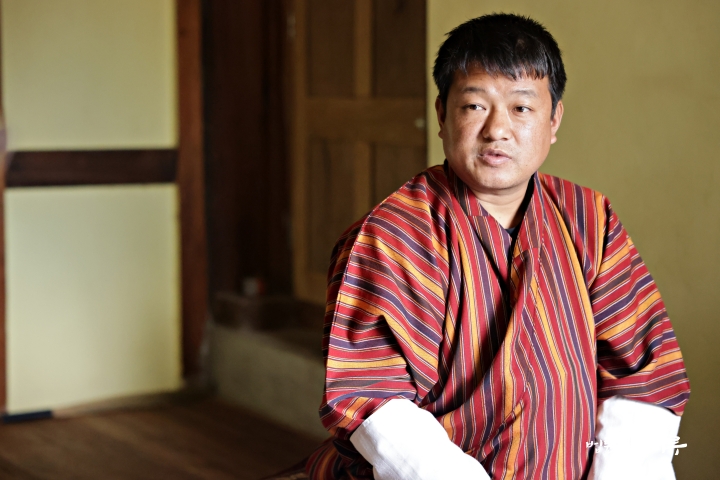
“Did the engineer visit the site to make the estimate?”
“No, he made the estimate by calculating the distance without visiting the site.”
Sunim explained why the budget for Bardo Gewog was set higher compared to other villages and suggested a solution.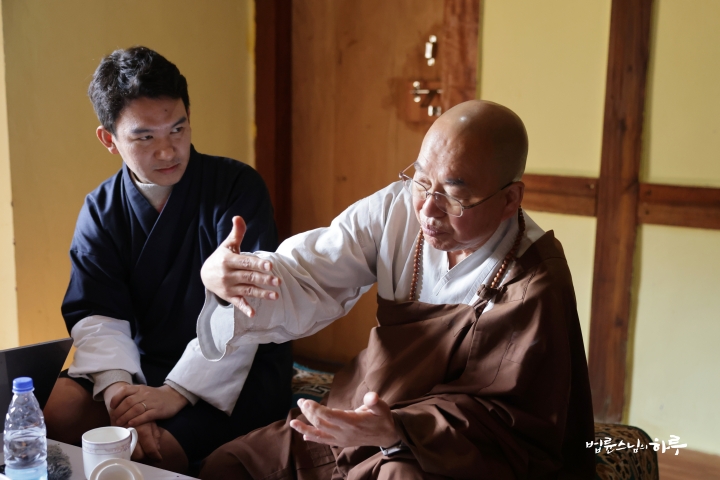
“The budget submitted by Bardo Gewog is higher compared to other villages. In my opinion, there are two options. First, have the engineer visit the site and make an accurate estimate again. Second, start with half of the currently requested budget, and receive additional support if needed. If we get a new estimate, it might delay the start of construction, so if you want to start right away, the second method might be more practical.”
Sunim pointed out the problem of the incorrect estimate to the Khomsar Tshogpa, then explained one by one the precautions to be taken during the irrigation construction and specific ideas.
“The waterway should be designed to facilitate smooth water flow and be sturdy enough not to collapse even during heavy rain. We should reinforce the embankment using stones and cement, and also consider adding drainage sections in case of water overflow.” 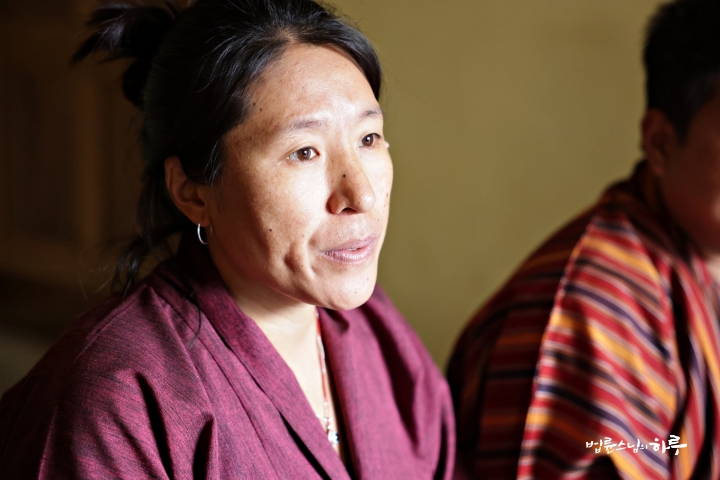
At the end of the meeting, Sunim offered words of encouragement.
“This is the first project for the Khomsar Tshogpa, so please have the planning officer check everything thoroughly.” (Laughter)
“Yes, I understand.”
At 1:40 PM, they finished the meeting and got back in the car to head to the next gewog. After about an hour’s drive, they arrived at Shingkhar Gewog. Guided by the Tshogpa and Gup, they went to the Shingkhar Gewog meeting hall where the residents had gathered.
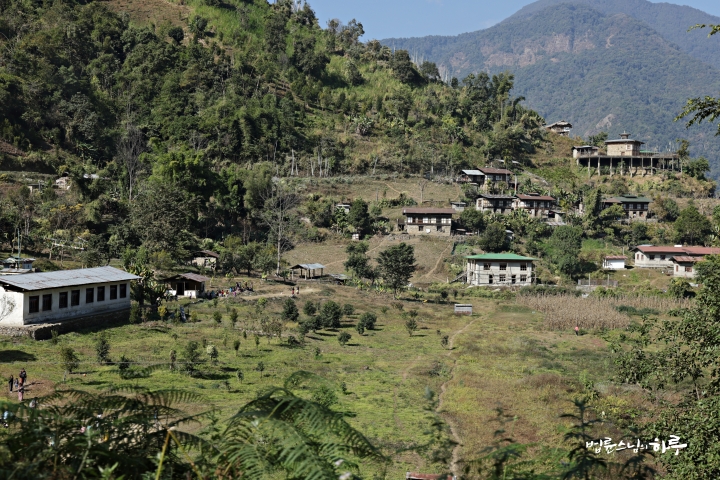
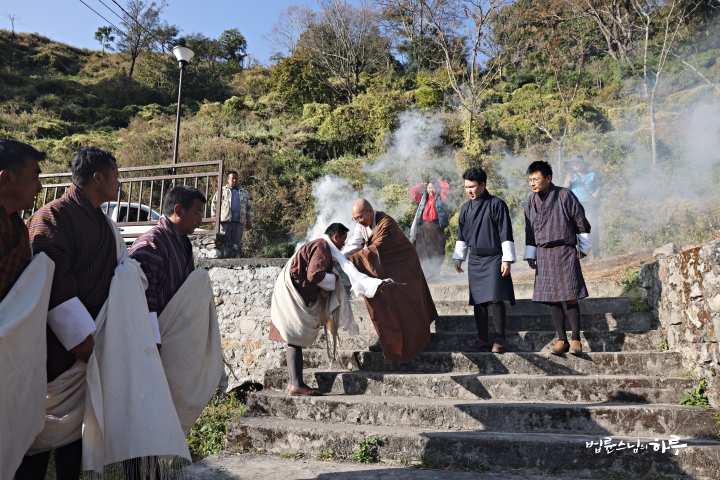
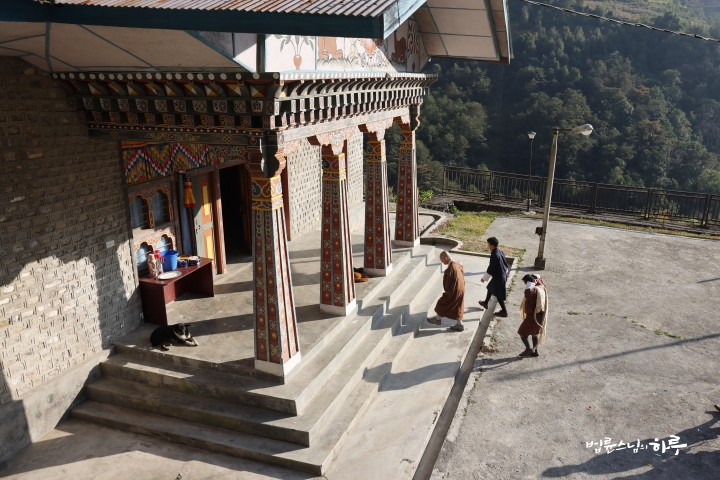
The meeting hall was quite spacious and equipped with sound facilities, and about 30 residents of Singkal Chiog had gathered. After a brief traditional welcome ceremony, Chokba explained the village situation. Then, Sunim greeted the residents and asked about their difficulties.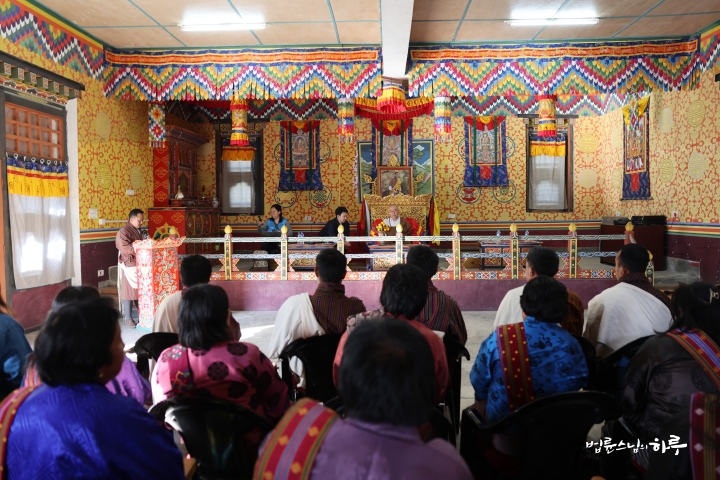
The residents’ requests were as follows:
“Many people have knee pain. We would be grateful if you could provide medicine that can treat it.”
“We want to build houses because we don’t have homes. The cost of wood materials is too high.”
“We want to repair our houses.”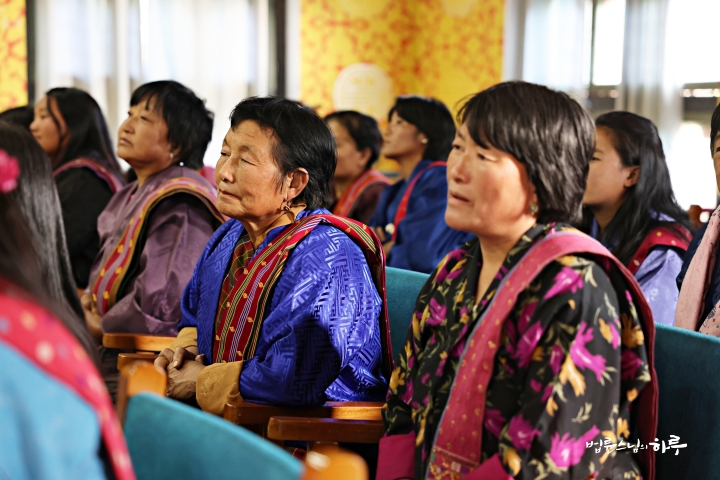
Compared to other Chiwogs, the residents’ living conditions seemed slightly better, and there weren’t many requests. After listening to all the residents’ stories, Sunim explained the principles of JTS support.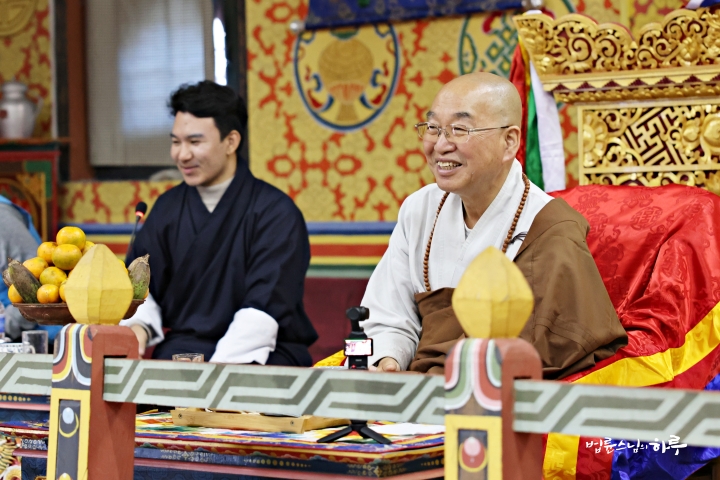
“JTS supports people who want to repair their homes but absolutely cannot afford it. It’s not like a government project where everyone who applies gets support unconditionally. We visit the homes directly to investigate, and only provide support when we determine that ‘this person really needs assistance.’ There are three criteria for making this judgment:
First, is the house absolutely necessary?
Second, are they so poor that they cannot build the house on their own?
Third, can they build it themselves, or can the villagers build it together?
We only provide support if these three conditions are met. If someone can do the work but lacks tools, we provide the tools. If they don’t know how to make a table, we support them in learning the skill. While building a house requires a professional carpenter, you should learn home repair skills so that you can continue to fix things in the future.”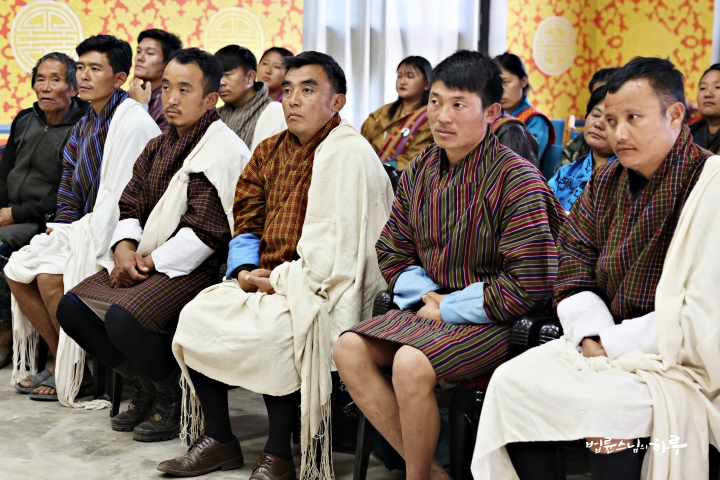
Sunim emphasized the priorities for support.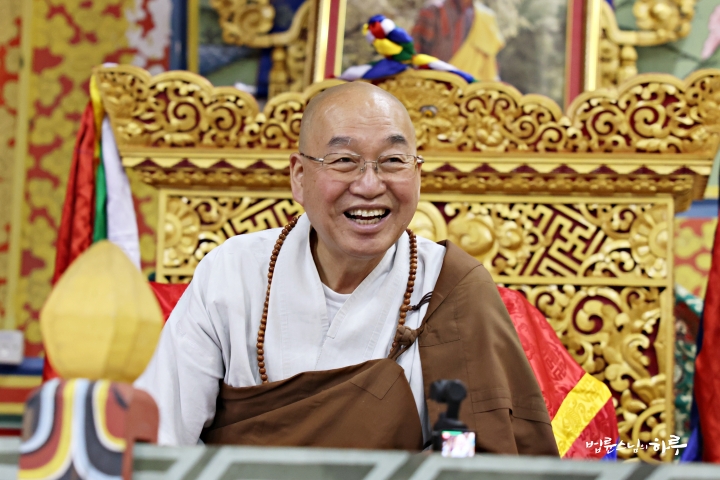
“Even within the same Dzongkhag, villages deep in the mountains need more help, while villages like this one with slightly better living conditions will receive less support. You know Jopka Gewog, right? When I visited Chiwog in Jopka Gewog, I saw people living in very difficult conditions. Such places need more assistance.”
A resident asked.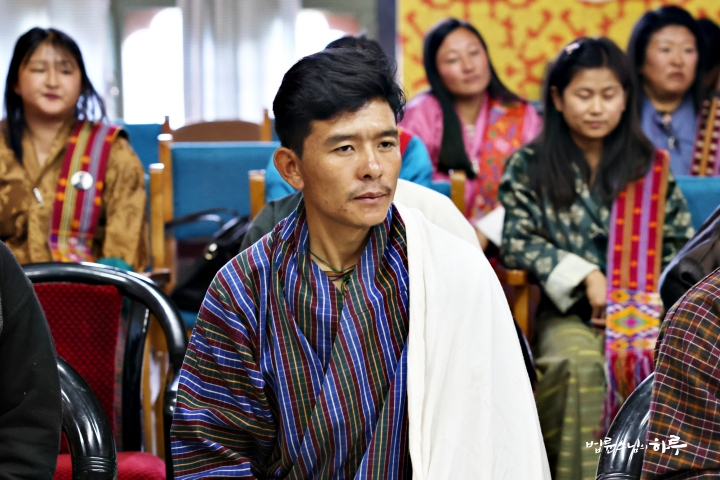
“Many people have knee problems. Is medical support difficult?”
“Yes, improving residents’ living conditions is our first priority. The second is improving public facilities. Medical support is third. We will provide medical support, but it will be a lower priority. In the future, we plan to send people from the Gewog to assess your situation. For example, if there are two people who need housing, one with a family of five and another living alone, we will prioritize the one with a larger family. If there’s a case where someone has children in the city who don’t help at all, versus someone who truly has no family to help, we will prioritize the person without any family support.
If we visit a place that reportedly has no electricity or flooring, but find many empty bottles and the homeowner constantly drinking, their priority will be lowered. It doesn’t make sense to have money for alcohol but not for home repairs. Do you understand?”
“Yes.”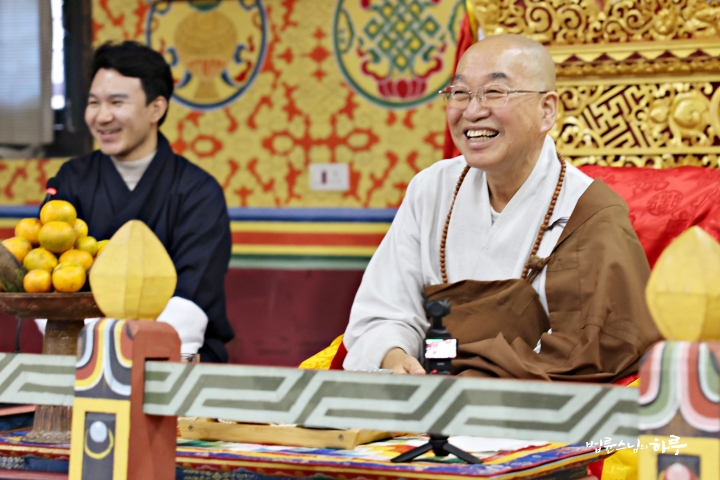
“Anyone with difficulties can apply. But not the wealthy, as they have the ability to fix things themselves. Even if you apply to JTS, you must do the repairs yourself. If you need room partitions, apply to install partitions. If you need shelves, apply to install shelves. Next time you meet me, wear slightly worn clothes. Otherwise, I might misunderstand and think you’re all well-off.” (Laughter)
“We wore clean clothes today because we were afraid you’d be disappointed if we came looking too shabby.” (Laughter)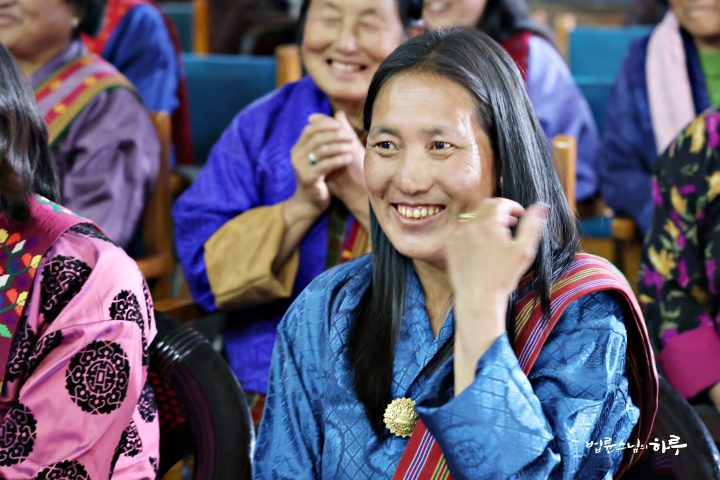
After talking with the residents of Singkhar Chiwog for about an hour, Sunim visited the boarding school in the village. It was a large school with 115 students, 100 of whom were boarders.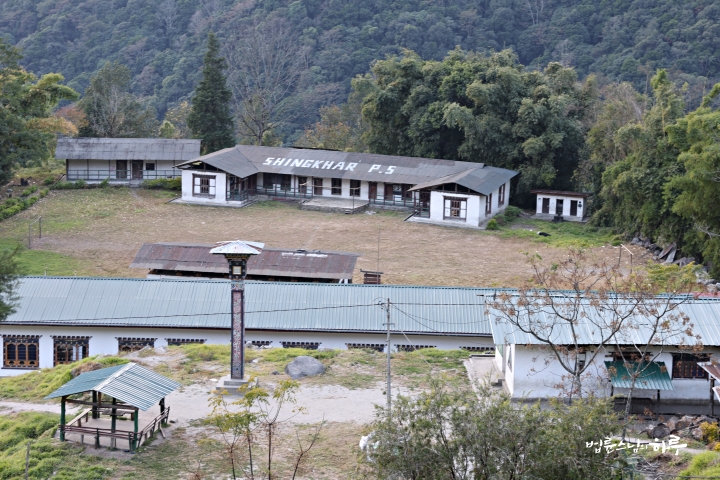
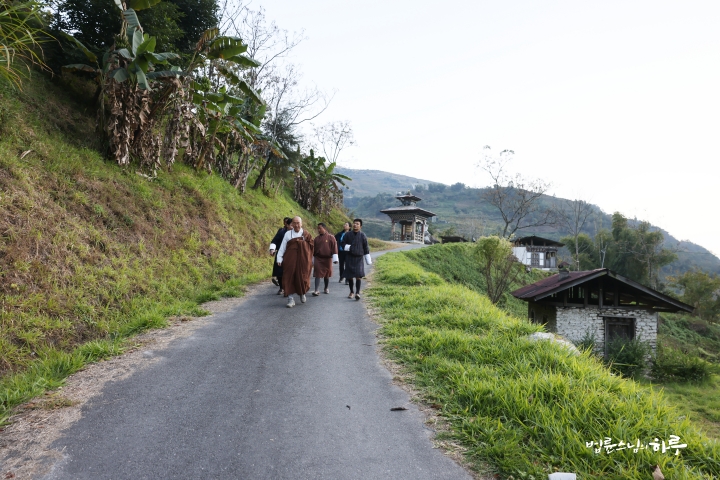
Upon inspecting the school’s interior, the dormitory and toilets seemed fine, but the washroom needed repairs, and the septic tank was already full and needed expansion.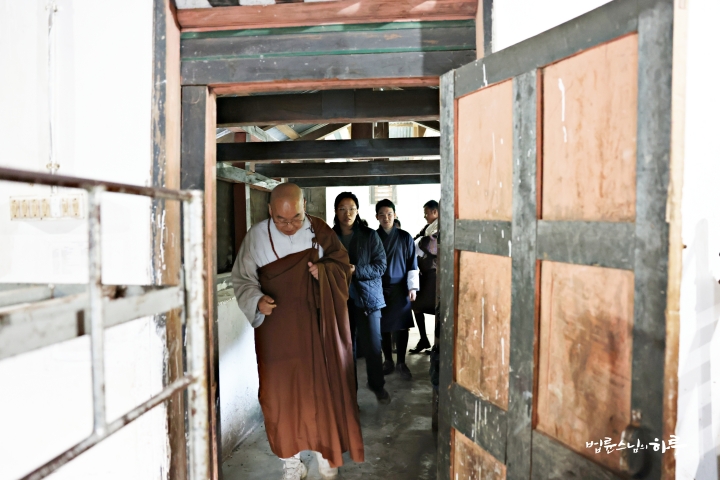
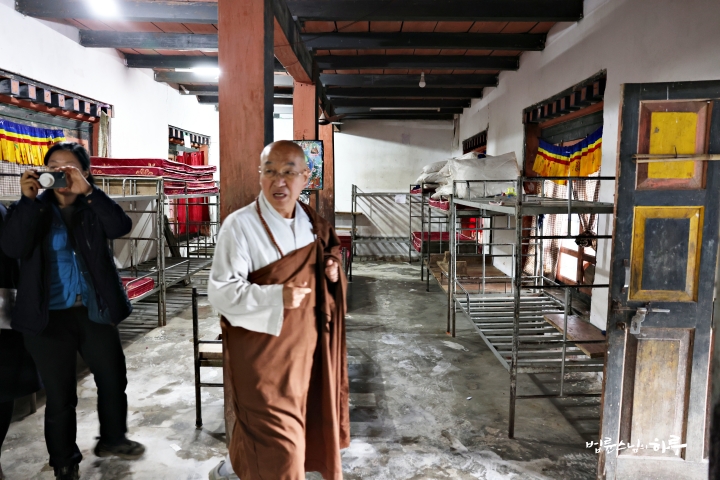
While surveying the school grounds, a dangerous section of the path used by students was observed, with deep potholes. There was also an unhygienic area where part of the school’s drainage system was disconnected.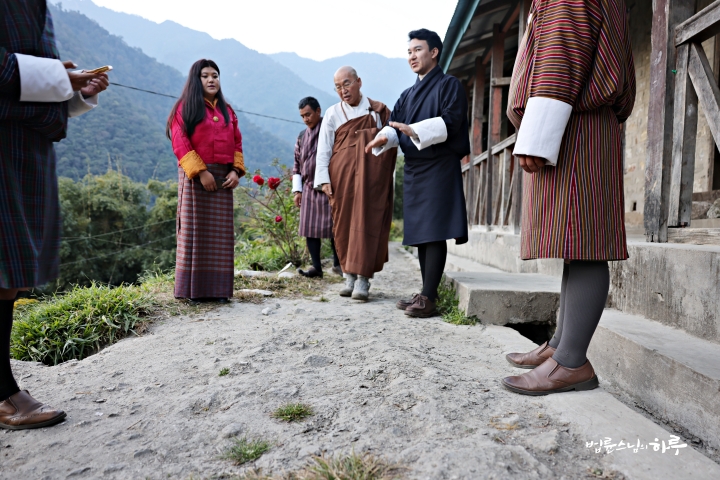
After completing the survey, Sunim detailed to the planning officer what needed to be supported for the students.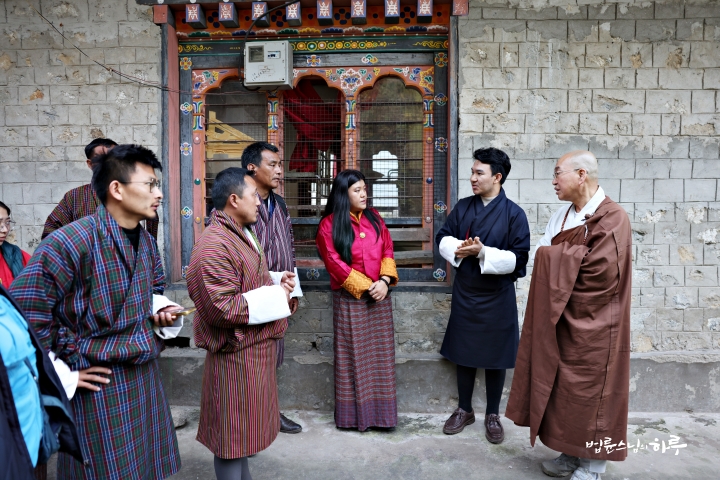
At 5 o’clock, the survey was completed, and they went to the lodging in Wamling.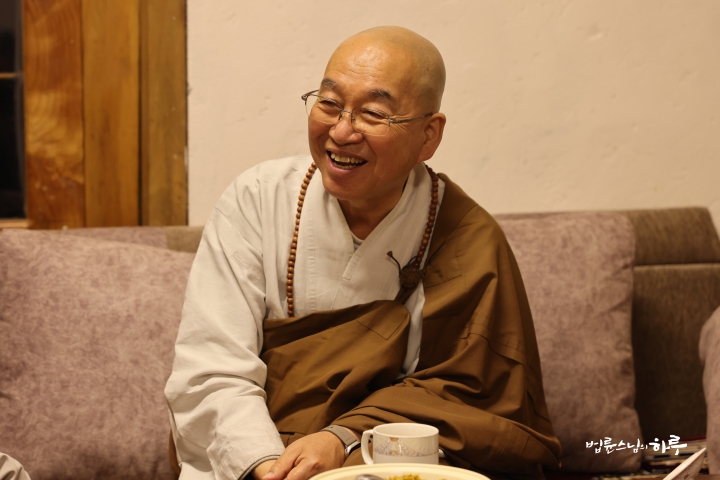
After arriving at the lodging, Sunim had tea and talked with the group, then proofread manuscripts and ended the day. Tomorrow, they plan to survey Wamling, Tsholingkhar, Lading, and Nimshong Chiwogs in Singkhar Gewog.
As there was no Dharma talk today, we’ll introduce the content from the Happy Dialogue Dharma Q&A lecture held in Seongnam City on the 16th.
I Have Many Things I Want to Do, but I’m Worried That I’m Not Good at Anything
“How many seconds does it take you to run 100 meters?”
“I’m not sure.”
“You must have had a fitness test in high school. What was your time then?”
“I think it was about 10 seconds.”
“Why are you saying such nonsense when you’re perfectly fine? The current world record for 100 meters is 9.58 seconds. Olympic gold medalists run it in about 10 seconds. And you’re saying you ran it in 10 seconds? Did you run it in about 17 seconds?”
“I think I was a bit faster than that.”
“How fast were you then? Did you run it in 15 seconds?”
“I think so.”
“So, compared to someone who runs it in 17 seconds, is running it in 15 seconds fast or slow?”
“It’s fast.”
“Then, compared to someone who runs it in 13 seconds, is 15 seconds fast or slow?”
“It’s slow.”
“You just said it was fast, and now you’re saying it’s slow. So, 15 seconds is neither fast nor slow. Saying 15 seconds is ‘fast’ or
‘slow’ comes from comparison and doesn’t stand alone. 15 seconds is slower than 13 seconds but faster than 17 seconds. There’s no such thing as ’15 seconds is fast’ on its own. When we say ’15 seconds is fast,’ it’s actually short for ’15 seconds is faster than 17 seconds,’ with ‘than 17 seconds’ omitted. When we say ’15 seconds is slow,’ it’s short for ’15 seconds is slower than 13 seconds,’ with ‘than 13 seconds’ omitted.
Similarly, your statement ‘I’m not good at anything’ doesn’t strictly hold true. When you say you’re short, if you’re 160 cm tall, you’re shorter than someone who’s 170 cm. In running, you’re slower than someone who runs in 13 seconds. In studies, you’re thinking in terms of ‘I’m second place, worse than first place.’ You’ve set your own standards too high. As a result, you feel lacking in everything. You feel deficient in this and that, and think you’re not good at anything. Your perceived deficiency isn’t because you’re actually lacking, but because, to put it bluntly, your expectations are too high. You’ve set the bar so high, thinking you need to be first in studies, first in running, that you end up with this self-deprecating thought of ‘I’m not good at anything.’ It’s not a problem of you being inadequate, but of you being too ambitious.
Your self-esteem isn’t something you can find through effort. You need to let go of the unrealistic ambitions that have set your standards so high. You need to lower your gaze a bit. When you slightly lower your gaze, your perspective changes to ‘I’m good at many things.’ Right now, you’re not inadequate because you’re inherently inadequate, but because you want to be too excellent. You’re seeing yourself as inadequate because you’re caught up in the desire to be excellent.”
“Yes, thank you.”
“This is an incredibly difficult concept to grasp, but you seem to understand quickly. Our feelings of inferiority don’t arise because we are inferior. Most of your children develop inferiority complexes because of their parents. Why? Because parents’ expectations are too high. When a child comes home with a fifth-place ranking, parents should praise them saying, ‘Well done,’ but instead, they use first place as the standard and say, ‘Why did you only get fifth place?’ Always saying things like ‘Is that all you can do?’ leads children to develop psychological inferiority complexes.
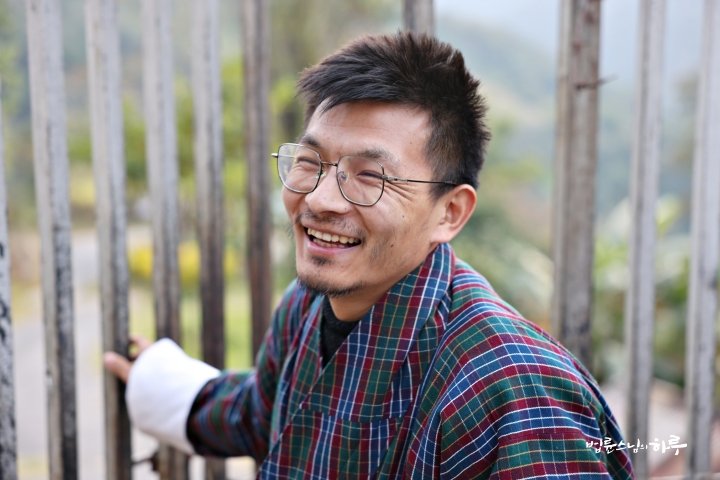
Recently, I was talking with an American and asked, ‘What’s the best thing about American education?’ They mentioned that teachers praise students a lot. If a student writes even a slightly good piece, they’ll say things like ‘You write very well’ or ‘You’ll become a novelist.’ They praise students to an extent that might seem exaggerated to Koreans. But how about Koreans? They often point out the shortcomings rather than the strengths. It’s because we’re all too ambitious. Our standards are so high that we always notice the lacking parts and point them out. This constantly deflates people’s spirits.
In reality, there’s nothing we’re particularly good or bad at. We’re just different from each other. Each person is a comprehensive being. But we compare our looks to actors, our singing to singers, our running to athletes, and our dharma talks to Venerable Pomnyun Sunim. We compare ourselves to experts in each field and think we’re inadequate in appearance, singing, height, sports, or speaking. If you only compare yourself to Venerable Pomnyun Sunim, there’s no problem. You might be worse than him in a few things, but there could be many more areas where you think, ‘I’m better than Venerable Pomnyun Sunim at this.’ But we compare ourselves to all the good points of others, so we end up thinking, ‘I’m not good at anything.’ No one here is inadequate. At the same time, no one is superior. Each and every person is dignified and worthy of respect.”
“Thank you.”




